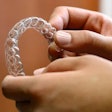
The American Association of Orthodontists (AAO) is urging members to report adverse events from clear aligners to the U.S. Food and Drug Administration's (FDA) database, as the volume of submissions may prompt stronger action and public warnings.
The FDA oversees the Manufacturer and User Facility Device Experience (MAUDE) database, which tracks adverse events involving medical devices, including direct-to-consumer (DTC) clear aligners, according to an AAO press release dated September 18.
After hearing concerns from the FDA about the risks of DTC aligners and members sharing clinical stories about the potential dangers, the AAO created a step-by-step guide to help members submit their reports to the MAUDE database. After submitting a report, members are encouraged to notify the AAO advocacy team by email.
These submissions are expected to play a critical role in influencing the FDA's response to the risks posed by mail-order orthodontic treatments, potentially leading to a public warning for consumers about the dangers of receiving orthodontic treatment without an in-person exam or x-rays, according to the release.
Furthermore, the FDA relies on complaints from healthcare providers to identify issues for investigation, and AAO member reports to the MAUDE database help bring attention to these risks, according to the release.
The initiative follows a 2021 effort by the AAO's legal and advocacy team, which led to a bipartisan letter from U.S. Congress requesting a Government Accountability Office (GAO) study on the regulation of DTC advertising for medical products. The GAO completed the study in 2023, highlighting FDA and FTC oversight responsibilities for DTC medical devices, including orthodontic treatments.
The AAO's annual public policy survey revealed that 77% of members have treated patients needing retreatment after using DTC aligners without an initial in-person exam.




















